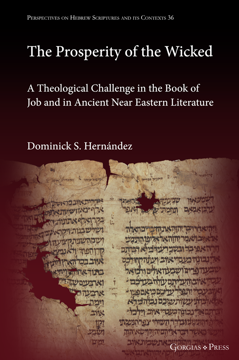Dominick S. Hernández

Dominick S. Hernández (PhD, Bar-Ilan University) is associate professor of Old Testament at Talbot School of Theology, Biola University, in La Mirada, California where he teaches an assortment of classes in Biblical Studies and ancient Near Eastern languages and literature. Visit his website at: www.domshernandez.com.
The Prosperity of the Wicked (paperback)
A Theological Challenge in the Book of Job and in Ancient Near Eastern Literature
ISBN: 978-1-4632-4822-2
Does Job convincingly argue against a fixed system of just retribution by proclaiming the prosperity of the wicked—an assertion that distinctly runs contrary to traditional biblical and ancient Near Eastern wisdom? This study addresses this question, giving careful consideration to the rhetoric, imagery, and literary devices used to treat the issue of the fate of the wicked in Job’s first two rounds of dialogue, where the topic is predominantly disputed. The analysis will glean from related biblical and non-biblical texts in order to expose how Job deals with this fascinating subject and reveal the grandeur of the composition.
$75.00 (USD) $60.00 (USD)
The Prosperity of the Wicked
A Theological Challenge in the Book of Job and in Ancient Near Eastern Literature
ISBN: 978-1-4632-4424-8
Does Job convincingly argue against a fixed system of just retribution by proclaiming the prosperity of the wicked—an assertion that distinctly runs contrary to traditional biblical and ancient Near Eastern wisdom? This study addresses this question, giving careful consideration to the rhetoric, imagery, and literary devices used to treat the issue of the fate of the wicked in Job’s first two rounds of dialogue, where the topic is predominantly disputed. The analysis will glean from related biblical and non-biblical texts in order to expose how Job deals with this fascinating subject and reveal the grandeur of the composition.
$114.95 (USD)


